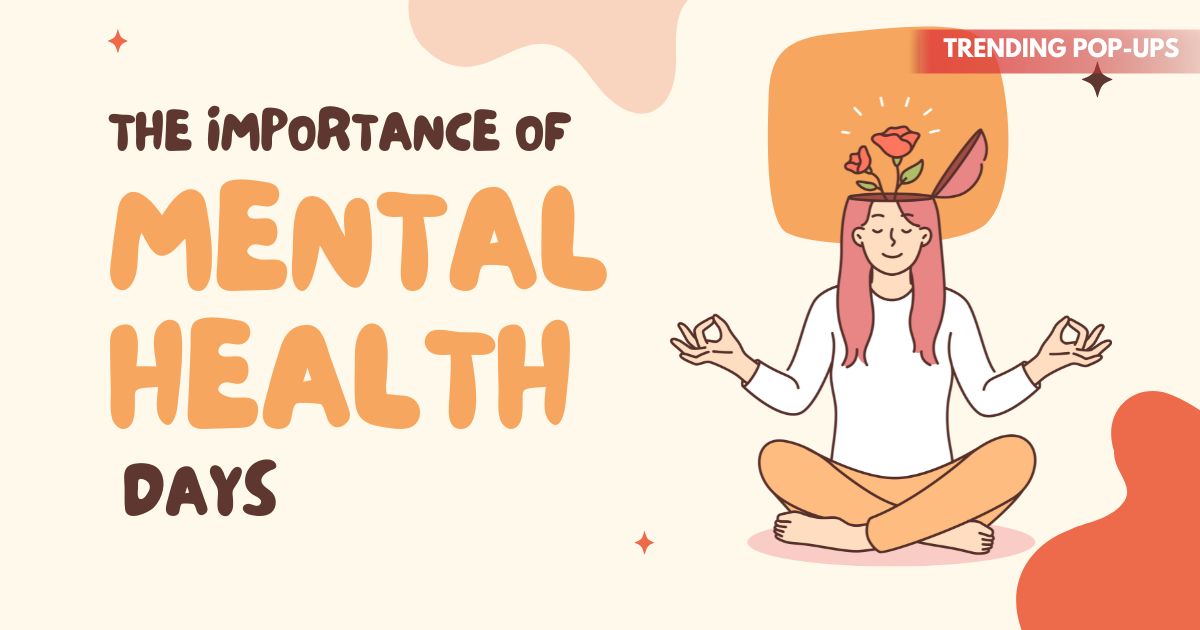In today’s fast-paced, high-pressure world, people often prioritize work, responsibilities, and productivity over their well-being. While physical health gets attention through sick leaves or medical appointments, mental health is frequently neglected. Taking a mental health day is just as vital as resting when you’re physically ill. It allows your mind to reset, recharge, and restore balance, ultimately preventing burnout and improving overall performance.
This article explores the importance of mental health days, why they matter, and how to make the most of them.
What Is a Mental Health Day?
A mental health day is a planned break from work, school, or daily responsibilities to focus on emotional, psychological, and social well-being. Unlike vacations, which may involve travel or leisure, a mental health day is often about rest, self-care, and resetting the mind.
Taking time for mental well-being can reduce stress, prevent exhaustion, and help individuals return to their responsibilities with renewed focus and energy.
Why Mental Health Days Are Important
1. Prevents Burnout
Consistently working without breaks leads to burnout—a state of chronic stress, fatigue, and lack of motivation. A mental health day helps break this cycle, allowing you to rest before stress becomes overwhelming.
2. Improves Productivity
Paradoxically, stepping away from work increases long-term productivity. After a mental health day, many people return with improved concentration, better problem-solving skills, and higher efficiency.
3. Supports Emotional Balance
Emotional overload can lead to irritability, anxiety, or even depression. A day focused on mental health provides the opportunity to process emotions, regain perspective, and reduce negativity.
4. Reduces Physical Symptoms of Stress
Stress often manifests physically as headaches, insomnia, muscle tension, or digestive issues. By lowering stress levels, mental health days promote better overall health.
5. Encourages Self-Awareness
Taking time off encourages reflection on your needs, goals, and boundaries. It fosters self-awareness, helping you identify what drains your energy and what restores it.
Signs You May Need a Mental Health Day
It’s important to recognize when your body and mind are signaling a need for rest. Some common signs include:
-
Feeling constantly tired or drained
-
Difficulty concentrating or making decisions
-
Increased irritability or mood swings
-
Trouble sleeping or oversleeping
-
Loss of motivation or enthusiasm
-
Physical stress symptoms like headaches or stomach aches
Listening to these signs can prevent more severe mental health challenges in the long run.
How to Spend a Mental Health Day Effectively
Taking a day off for your mental health is not about being lazy—it’s about intentional rest and care. Here are some ways to make it effective:
1. Rest and Recharge
Allow yourself to sleep in, nap, or simply relax without guilt. Rest helps reset the nervous system.
2. Practice Self-Care
Engage in activities that nurture your mind and body, such as meditation, journaling, yoga, or a long bath.
3. Limit Screen Time
Constant exposure to emails, news, and social media can be draining. Unplug for a few hours to give your mind a break.
4. Spend Time Outdoors
Fresh air and nature reduce stress and boost mood. Even a short walk outside can have significant benefits.
5. Connect with Supportive People
Talking with friends or loved ones can bring comfort and perspective, helping you feel less isolated.
6. Do Something You Enjoy
Reading, painting, cooking, or listening to music can bring joy and stimulate creativity.
7. Reflect and Plan Ahead
Use the day to check in with yourself. Ask: What changes can I make to better balance work and life? Small adjustments can prevent future stress.
The Role of Employers and Schools
Employers and educational institutions play a critical role in normalizing mental health days. Workplaces that encourage mental wellness often see:
-
Higher employee retention
-
Reduced absenteeism
-
Increased job satisfaction
-
Better overall performance
Schools that support mental health days help students build resilience, prevent academic burnout, and foster a healthy relationship with learning.
Breaking the Stigma Around Mental Health Days
One of the biggest barriers to taking a mental health day is the stigma attached. Many people feel guilty or fear judgment for prioritizing their mental health. However, just as we rest when physically unwell, it’s equally important to take a break for mental wellness. Normalizing conversations about mental health can empower individuals to take care of themselves without shame.
Long-Term Benefits of Mental Health Days
When taken regularly and intentionally, mental health days contribute to:
-
Stronger resilience to stress
-
Improved emotional intelligence
-
Better physical health
-
Enhanced creativity and innovation
-
Greater work-life balance
Also Read : Tips for Healthy Aging – Nutrition, Lifestyle & Habits for Longevity
Frequently Asked Questions (FAQs)
1. How often should I take a mental health day?
It depends on your stress levels and lifestyle. Some people benefit from one every few months, while others may need them more frequently.
2. Are mental health days the same as sick days?
Yes. Mental health is part of overall health, so mental health days are just as valid as physical sick days.
3. What should I tell my employer if I need a mental health day?
You can simply say you’re taking a sick day or, if comfortable, be transparent about needing time for mental wellness.
4. Can students take mental health days?
Yes. Many schools now allow excused absences for mental health, helping students manage stress and prevent burnout.
5. What if I feel guilty about taking a mental health day?
Remember that prioritizing your well-being makes you more productive, balanced, and effective in the long run. Self-care is not selfish—it’s essential.



